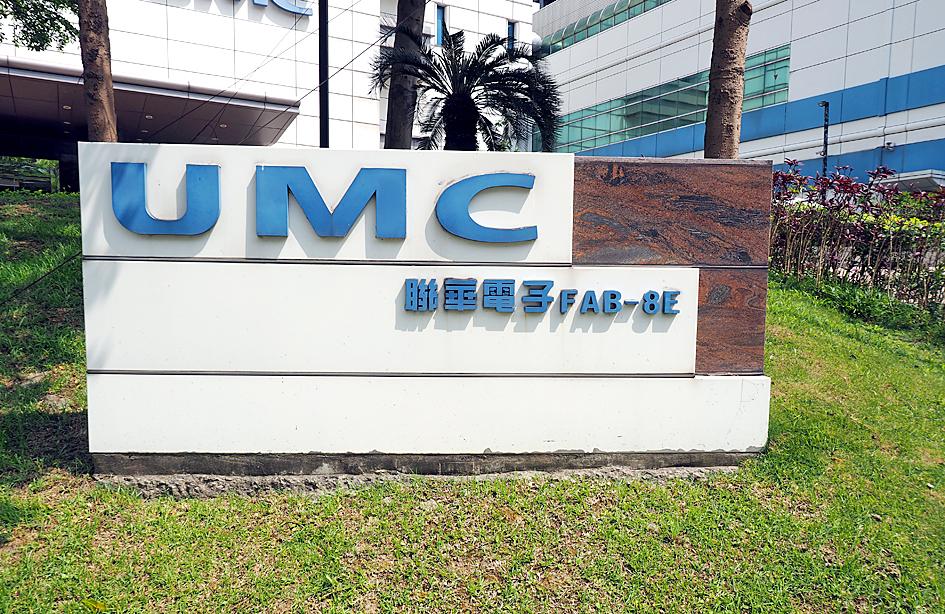Thanks to a persistent chip shortage United Microelectronics Co (UMC, 聯電), the world’s third-largest contract chipmaker, yesterday posted record-high revenue for last month.
Revenue rose 10.21 percent to NT$15.53 billion (US$547.02 million), compared with NT$14.09 billion in January last year.
On a monthly basis, revenue edged up 1.57 percent from NT$15.29 billion.

Photo: David Chang, EPA-EFE
UMC told investors on Jan. 27 that chip demand had significantly outpaced what it could supply, and that its utilization rate would be close to 100 percent this quarter from 99 percent last quarter.
The company plans to spend US$1.5 billion in capital expenditure this year, which would increase capacity by 3 percent from last year, UMC said at that time.
Growing 5G smartphone penetration, rising demand for notebook computers due to the work-from-home trend and a robust pickup in automotive chips boosted demand for 8-inch and 12-inch wafers, UMC copresident Jason Wang (王石) told the Chinese-language Commercial Times yesterday.
The supply-demand imbalance is likely to carry into 2023, as chip demand continues to grow and it would take 14 and 18 months to add manufacturing equipment, Wang said.
WINBOND, MACRONIX
Memorychip maker Winbond Electronics Corp (華邦電子) yesterday reported that consolidated revenue soared 87.45 percent to NT$6.9 billion last month, compared with NT$3.68 billion a year earlier. That represented a 1.4 percent increase from NT$6.81 billion in December.
Macronix International Co (旺宏電子), a supplier of chips for Nintendo Co’s game consoles, yesterday said its consolidated revenue expanded 9.09 percent to NT$3 billion last month from a year earlier.
On a monthly basis, revenue dipped 9.36 percent from NT$3.31 billion.
The company said it is “upbeat” about business this year and sees no “dark clouds” on the horizon.
This year would be an “even better” year than last year, it said.

Among the rows of vibrators, rubber torsos and leather harnesses at a Chinese sex toys exhibition in Shanghai this weekend, the beginnings of an artificial intelligence (AI)-driven shift in the industry quietly pulsed. China manufactures about 70 percent of the world’s sex toys, most of it the “hardware” on display at the fair — whether that be technicolor tentacled dildos or hyper-realistic personalized silicone dolls. Yet smart toys have been rising in popularity for some time. Many major European and US brands already offer tech-enhanced products that can enable long-distance love, monitor well-being and even bring people one step closer to

Malaysia’s leader yesterday announced plans to build a massive semiconductor design park, aiming to boost the Southeast Asian nation’s role in the global chip industry. A prominent player in the semiconductor industry for decades, Malaysia accounts for an estimated 13 percent of global back-end manufacturing, according to German tech giant Bosch. Now it wants to go beyond production and emerge as a chip design powerhouse too, Malaysian Prime Minister Anwar Ibrahim said. “I am pleased to announce the largest IC (integrated circuit) Design Park in Southeast Asia, that will house world-class anchor tenants and collaborate with global companies such as Arm [Holdings PLC],”

Sales in the retail, and food and beverage sectors last month continued to rise, increasing 0.7 percent and 13.6 percent respectively from a year earlier, setting record highs for the month of March, the Ministry of Economic Affairs said yesterday. Sales in the wholesale sector also grew last month by 4.6 annually, mainly due to the business opportunities for emerging applications related to artificial intelligence (AI) and high-performance computing technologies, the ministry said in a report. The ministry forecast that retail, and food and beverage sales this month would retain their growth momentum as the former would benefit from Tomb Sweeping Day

Thousands of parents in Singapore are furious after a Cordlife Group Ltd (康盛人生集團), a major operator of cord blood banks in Asia, irreparably damaged their children’s samples through improper handling, with some now pursuing legal action. The ongoing case, one of the worst to hit the largely untested industry, has renewed concerns over companies marketing themselves to anxious parents with mostly unproven assurances. This has implications across the region, given Cordlife’s operations in Hong Kong, Macau, Indonesia, the Philippines and India. The parents paid for years to have their infants’ cord blood stored, with the understanding that the stem cells they contained